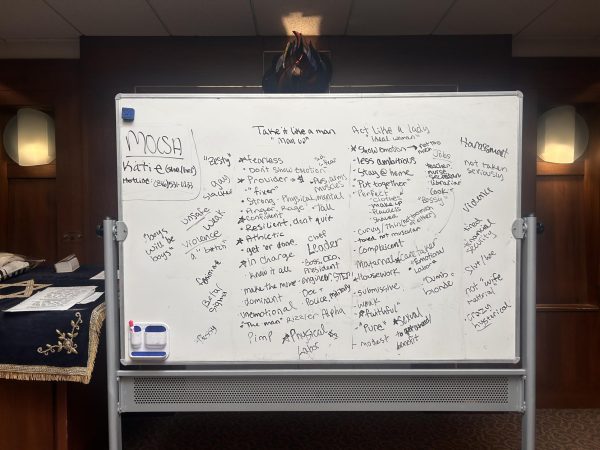As a woman, I have viewed and experienced situations with toxic masculinity. The definition of masculinity has varied over the years, holding diverse social norms and nationwide definitions. Throughout history, men have played many roles in society, yet they all surround around two points: strength and toxicity.
Sara Whelan, HBHA’s School Psychologist, says toxic masculinity is when, “those who identify as male would, from society, get messages, and give them the idea of what is male or what is being a man.” In-depth, toxic masculinity refers to men whose idea of “manliness” reflects domination and aggression. It pressures men to behave in a certain way, and it doesn’t go without affecting a single male in any form.
Holding expectations nearly impossible to maintain, men experience a decline in mental health typically beginning from teenage to adult years. Men refrain from expressing “weak” emotion often, or at all, or show vulnerability. Men are often more socially accepted if they only show the following emotions: joy, ego, anger, or a neutral state. Unlike women who are socially perceived as dramatic and emotional for allowing themselves to show their feelings, men are more often reserved and refrain from opening up.
It is important to reach out to people for help when needed. It can save lives and can provide a higher quality of life. Studies show men’s suicide rates (3.90x more than women according to AFSP) have been skyrocketing over the past few years because of this issue. Not only is it incredibly disheartening, but concerning. Suppressing feelings to seem stronger and masculine is not healthy and it is considered toxic as well. Suppression can lead to consistent outbreaks of anger, stress, anxiety; it will, “create shame, create this way to live that… doesn’t allow for guys to express their emotions,” said Whelan. Rather than validating men for a tough look and dominance, men should be validated for seeking support.

If the outbreaks of anger occur in such high concentration, toxic relationships, tending to be one-sided from the man, begin to build. The toxicity can and will hinder healthy connections between people. Emotional detachment from society and oneself makes it hard to connect with someone on a genuine level. Feeling and empathy are what deeply bring two together, and with a lack of both, there is an acquaintance instead of a friend in the making. Guys who follow and believe in toxic masculinity seem to also have non-genuine relationships with other men.
Trust can be broken within relationships consisting of toxic masculinity. Our society allows men to make non-changeable mistakes or be unfaithful with little to no consequence. These factors can take a toll on trust between people and make relationships hard to handle. As specified by Whelan, men could lack communication because they may not feel comfortable showing vulnerability, and feel ashamed of internalized emotion. Suppressed emotions could display themselves in, “maladaptive ways,” as Whelan specifies. It could hurt relationships through fights which cause mistrust.
The media is a wonderful representation of our society and its expectations and dynamics. Men are expected to post about “manly” things such as politics, exercise, business, and popularity, or not post at all. In the media, many people express their opinions on how a man should act, who he should be, and what he should pursue. There are careers and sports which men don’t particularly find interest in because they seem “feminine,” such as nursing, housecare, childcare, and teaching.
In my personal opinion, toxic masculinity and its values should be brought into awareness. There are positive aspects to it like independence, holding onto masculinity, physical strength, and courageousness. However, factors including violence, rage, indifference, and always having an advantage when it comes to managerial roles should be changed in drastic ways. New times call for new measures, meaning men shouldn’t have the highest expectations to stay toxic, reserved, and feel like they need to always have a leadership role in society.
Some men take offense to being compared to a woman, which is not only a considerable insult to women, but another aspect of toxicity. With the rise of women in “masculine” careers, men begin to compare themselves to women and do everything in their power to take over them.
Whelan says, “[what if] they’re dating a female who just happens to have a job that gets a bigger salary, and that’s very common in today’s society, and that person may feel like they’re not as good as [the woman].” Being resilient and hardworking is a great trait to have when used for positive situations. When those traits are expressed negatively, social roles slowly start to break down and turn into disregard and demotion of women.
Religion has its own values on toxic masculinity. In Judaism, according to Chabad, women are more advanced than men when it comes to spirituality. The reason men are obligated to wear Kippot, Tallit, and Tefillin is to find the certain connection with G-d women were practically born with. Wearing Tefillin is categorized as a Mitzvah Aseh SheHaZman Grama (time-bound mitzvah), from which women are exempt, so it is strongly encouraged by Orthodox and Traditional practices that women shouldn’t wear Tefillin (Halachipedia).

Young women celebrate their Bat Mitzvahs a year before young men have their Bar Mitzvahs, as women are already set to be mature and have a stronger spiritual connection with G-d. That reasoning can defend why the majority of Jewish women don’t read Torah, have fewer obligations, and are exempt from reading additional prayers during the three daily services.
From a fresh perspective, many non-Jews believe Judaism is a masculine-dominating religion because the men do most of the rituals; however, that is due to the fact women are naturally connected to G-d and don’t need so many forms of praise and learning to be on a high spiritual level.
In all, toxic masculinity is a commonly found phenomenon in our global society. It affects men of all ages by limiting their opportunities and giving them strictly enforced expectations. Not only does it affect relationships with other individuals, but the mental health of men as well. Awareness of this situation should be emphasized to control the widespread toxicity, and show it is okay to open up and show vulnerability at times. Men are just as human, and women are just as qualified, so the toxicity should be concealed.















